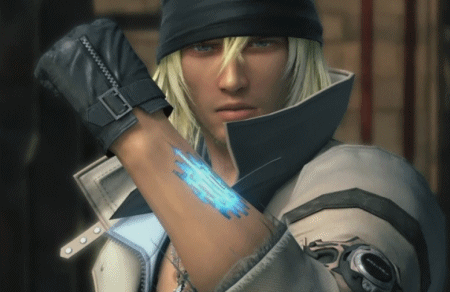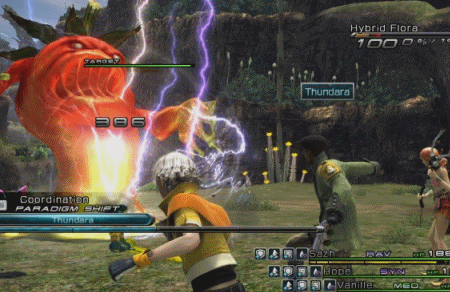 Review – Final Fantasy XIII
Review – Final Fantasy XIII
![]()
J-RPG
Let me be your fantasy.
![]()
Steve
The Final Fantasy (or FF from now) series is probably the most recognised JRPG in the West and has come to represent, for many, the pinnacle of this genre. It is as renowned for its lavish production values and over the top cutscenes as it is for being extremely traditional and never changing the basic formula. However FFXIII plays with and stretches this formula to the very breaking point to make a very different type of game.
First things first though, as with all FF games FFXIII has a big story to tell, and this time it chooses to drop you straight into the middle of it. The story concerns a floating world called Cocoon ruled by a dictatorial regime which is itself guided by benevolent beings called Falcie. Cocoon rests above an outer world called Pulse which is also ruled by beings called Falcie. The inhabitants of Cocoon live in fear of an invasion from Pulse and fear that any contact with the outside world will taint you and turn you into a servant of the Pulse Falcie.

A Cloud by any other name looks just as twattish.
For the first sections of the game you are thrust head first into a desperate attempt to escape the authorities of Cocoon, who are conducting a kind of mass evacuation as a result of the discovery of Pulse intruders. After a bit of an accident the protagonists find themselves branded exiles and are forced to flee for their lives. There is no hand holding and the story is very much mid way through when you start to play. It’s through the use of flashbacks throughout the game that the back story is filled in and the initially disparate characters are linked together. This is handled really well and a comprehensive log keeps you informed of any potential aspects of the plot you may have missed. It speaks volumes of the quality of the scripting and acting that you do genuinely become involved with the story waiting for the next reveal, and whilst some twists are easily guessed there are enough that come as a genuine surprise.
However the very nature of having an escape style story has lead to the majority of the game playing out at a breakneck pace. You are constantly hounded by the authorities and must press ever onwards. This manifests itself in the form of extremely linear level design, in fact for over two thirds of the game you simple run from point A to point B engaging in fights along the way. This in itself isn’t necessarily a bad thing as it does ensure that tension is kept ramped up, but it is a complete change to earlier FF games which, although linear to a point always allowed you to choose your own route from point A to B. In FFXIII you literally have no choice as to the route you take to arrive at your destination. The game does eventually open out to a certain extent near the very end of the game, but by this time you would have already sunk around 30 hours into a very linear experience.

I shall not kill you Goldfish. I will let the jungle finish you off. Aieeeee!
This linearity also extends itself to the inventory system, and in a massive departure for the JRPG genre as a whole there are no inns to rest in, traditional shops to buy from or NPCs to talk to. Healing is now automatic after each fight, but more of this latter, and shopping is handled over the “internet” accessed through your save points, which by the way are far more regular. In order to shop however you need Gill but this isn’t awarded through battles and is only gained through selling items already held, or by occasionally finding it in treasure spheres. This means that in order to make money you have to sell unwanted, yet expensive items. Think of it as you would a visit to Cash Converters. Additionally the number of shops you can access, and consequently the types of items you can buy, are dolled out to you after set points of the story.
This extreme simplification of the shopping mechanic initially feels very odd and totally at odds as to what a FF game is but then this is no normal FF. You no longer do you need to buy new magic or weapons as these are dished out to you through levelling up and finding treasure spheres, and because you will have all your health restored and all status ailments removed after each fight there is no longer the need to buy potions or medicine. Gone are the days of hoarding all your items until the end of the game only to find out you are now so powerful that you don’t need them, FFXIII cuts out all the waste from earlier games and focuses down to what is absolutely essential.
This simplification carries forward into the way in which your characters level up, as each has a prescribed experience tree to use. And the required experience increases in such a way as to remove any need for grinding from the whole game. Although in a break from tradition you can go back to the game once you’ve completed it and continue to level up your characters and enjoy the grind if you so wish. This new approach to levelling is further supported by the fact the game imposes level caps on you, which are only increased after certain plot moments. This changes the very nature of levelling up, and vastly improves the speed at which you can progress through the game. Gone are the tedious difficulty spikes where you would have to grind a few levels before attempting the battle, in this game the difficulty level is near perfect.
One of the biggest changes to the game is the way in which combat is handled. Firstly you only ever directly control the leader of your party, with the rest of your party being controlled by a very competent AI system. By removing direct control of the rest of the party this allows you to focus more on the flow of the battle and adjusting the tactics which are used. Each character has a series of roles to choose from, these are taken from a selection of six roles ranging from aggressive to defensive and from healers to debuffers. Initially the roles available are limited by the game, but as you progress more options open up giving you quite a bit of flexibility.
|
Gareth Secondary Review I’m by no means a Final Fantasy expert. I’ve played FFVI through FFXII (including FFX-2, but skipping FFXI) and only bothered to complete three of those, but I know what I like. I like Final Fantasy XIII. Before its Western release there was a lot of talk about linearity and a lack of towns and side quests. Honestly, I didn’t notice. There aren’t any towns in the usual JRPG sense, true, and side quests don’t become available until about 30 hours in, but as far as dungeon crawling goes this doesn’t feel any different to any other JRPG. In fact because there aren’t any random encounters it’s paced a little better than your average FF game. Visually the game is stunning more often than not and the FMVs (although a little grainy on the 360) are of a very high quality, even if they seem to be more about showing off than progressing the story. Musically FFXIII is a little disappointing. It’s all high quality stuff as you’d expect, but the majority is not very memorable at all. The characters start off incredibly annoying, but once they’ve calmed down and stop forcing their characteristics upon you (Lightning = badass, Vanille = cheerful, Snow = hero) they become far less offensive. The acting is alright, nothing stellar, but the cast do a decent job with the rather weak script. It’s the combat that will make or break this game for you. Once things get a little more complicated (which does take a while) then things become far more interesting, picking your classes being incredibly important. The longer boss battles can really require some strategic thought and the ability to retry battles instantly is very welcome and allows you to take risks without being punished. If you can make it through the initial overly simple 15 hours or so then you will eventually see what FFXII has to offer. Not my favourite JRPG on the 360 (that still goes to Lost Odyssey) but still a very solid entry in the Final Fantasy series and well worth checking out if you’re a fan. Secondary Score: 7/10 |
Before battle you can set paradigms, which is to say set which role each character uses, and in a stroke of genius during the battle you have the ability to instantly change your paradigm arrangement. This allows you to change the flow of the battle on the fly, and within a second you can go from an all out attack paradigm to a more conservative healing paradigm. Each paradigm brings a new feel to the battle with incorrect choices leading to arduous or even lost battles. This mechanic allows you to formulate plans of attack during each battle and effectively means you have access to hundreds of different offensive and defensive options.
With the enemies visible on the screen before a battle and the transition to and from battle mode greatly reduced battles are over much quicker in this game than in FFs of old. In fact the speed of the battles has led to a further change in the combat mechanic. It is still powered by the similar active battle gauge, with a little line counting down time until you can use a move, but this time you have the option to select auto battle. This chooses the most appropriate actions for you to use automatically stacks them so that you no longer need to worry about scrolling through menus to find that move you want. Although you can still do this if you want, it defeats the object and makes a fluid battle system seem all slow and tedious. Each battle is also graded out of five stars on the basis of speed of completion with five stars rewarding better spoils.
This extreme change completely reinvents an old system and gives the battles a dynamism which the series has been sorely lacking. By removing direct control of the allies, battles move at a better pace and leave you to the important matter of fighting rather than wondering if you should use ice magic or fire magic. I genuinely think this battle system is amazing.
On top of this battle system you have a comprehensive weapon and item levelling arrangement. Here you use items found as spoils from battles, or bought in shops, to upgrade your weapons which in turn confer better abilities to you. Level a weapon or item up sufficiently and it will evolve into another more powerful form. This aspect of the game can be totally ignored, but for the completionists this can offer hours of distractions as you strive to find the best items to use and in which quantity they are needed.
Overall then I’d say this is the most accessible Final Fantasy to date, yet it’s end game still retains more than enough grinding for the most die hard fan. The fundamental changes made here make the game more fluid, quicker and much more fun to actually play. The story is a good one which will keep you hooked and guessing over what is to come next and the visuals are spectacular. This is a great game and brilliant example of how to reinvent a long standing and admired franchise.
Rating: 








 8/10
8/10
